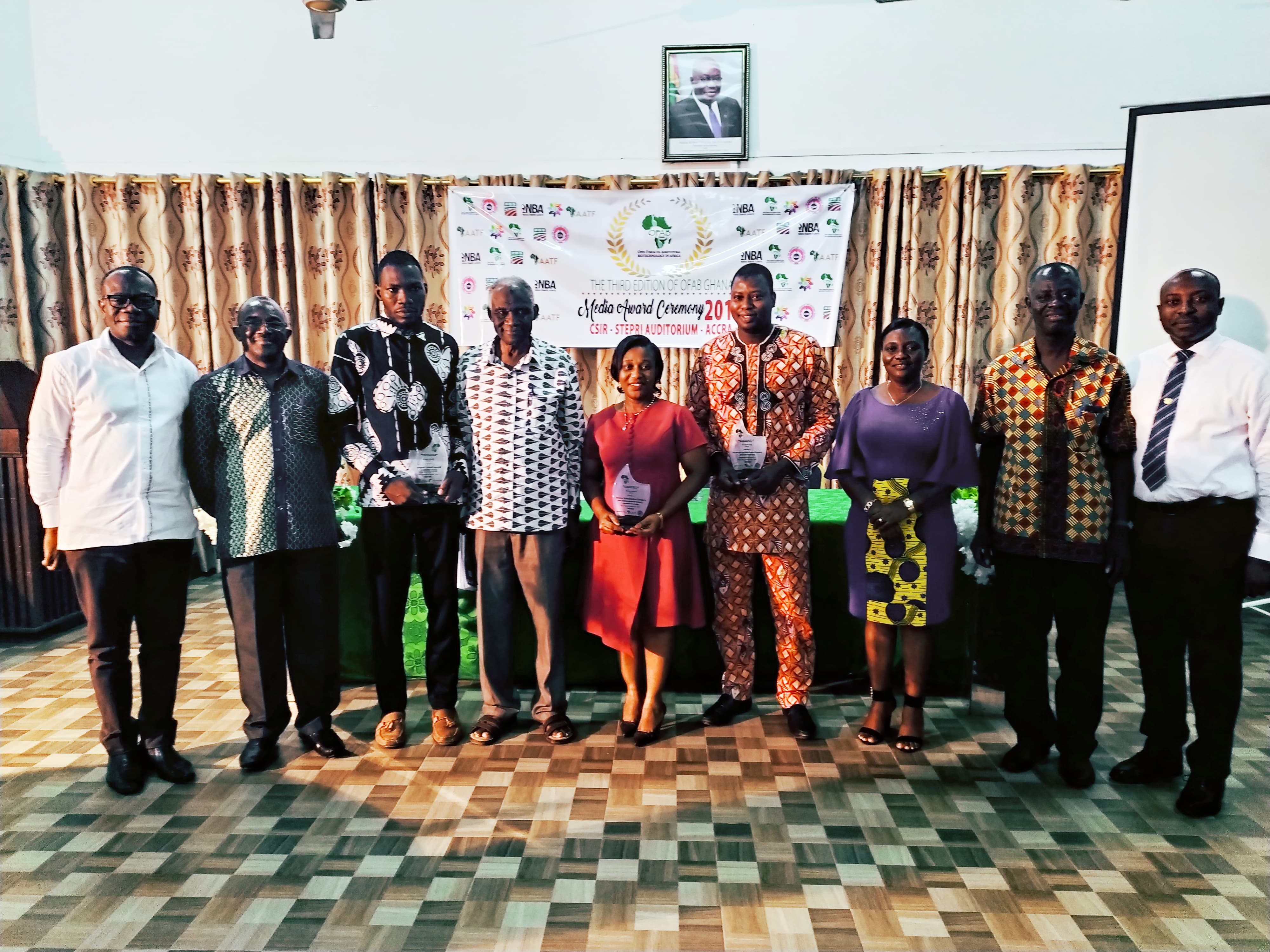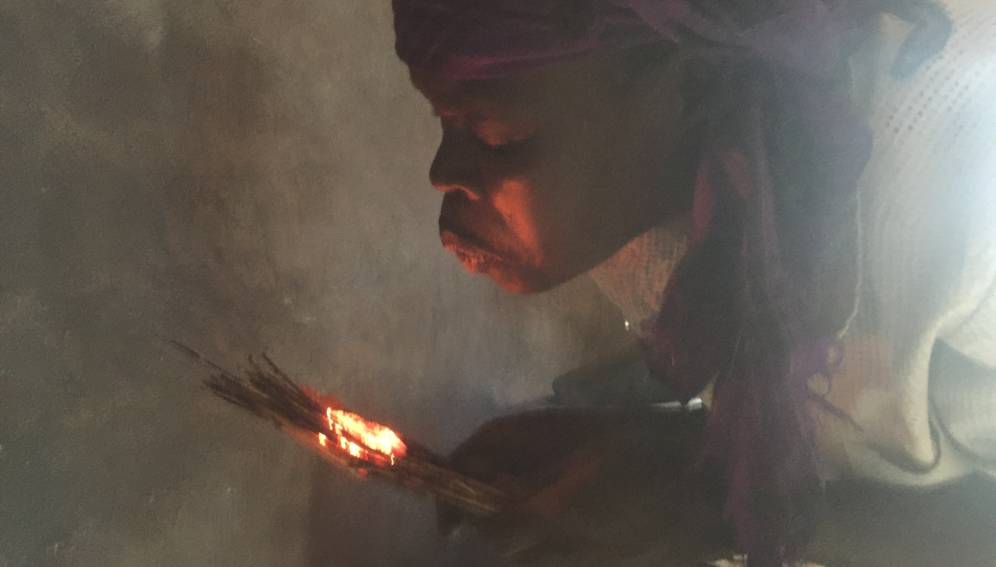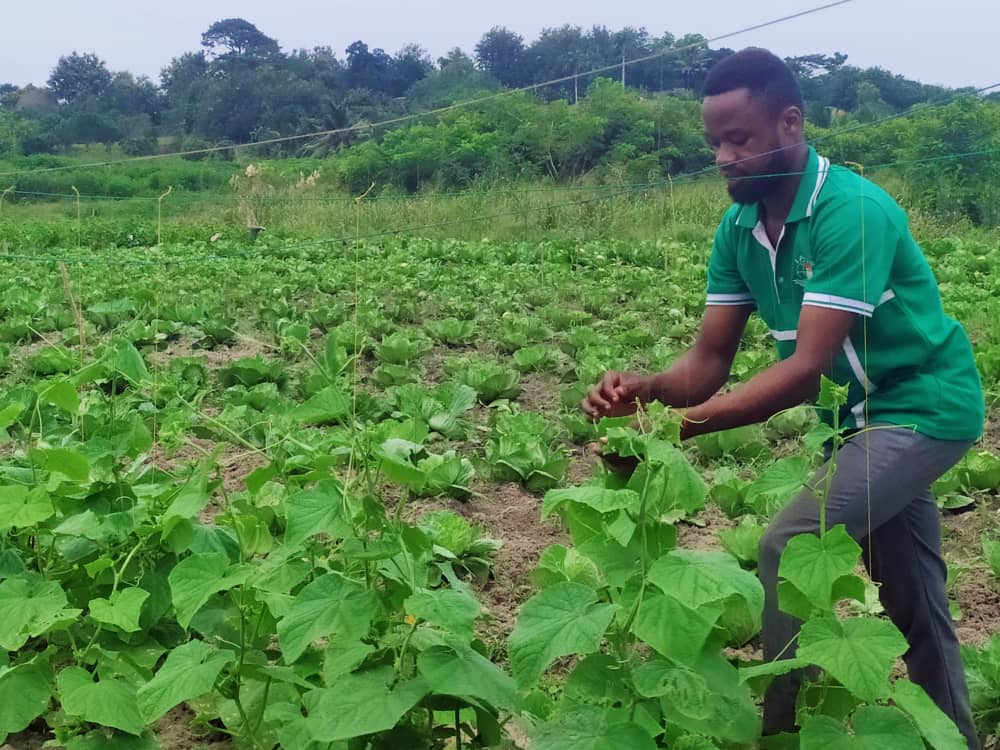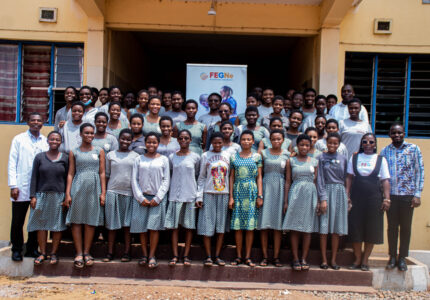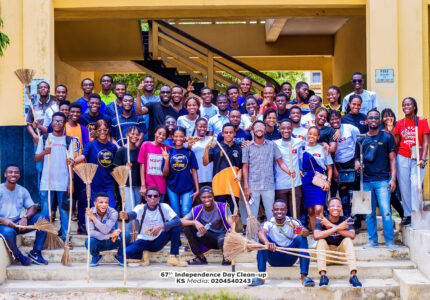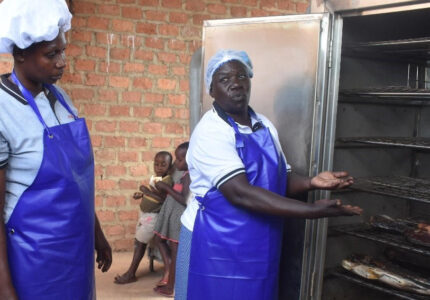The 3rd edition of the Open Forum on Agricultural Biotechnology (OFAB) awards took place on Monday, 4th September, 2019 at the Science and Technology Policy Research Institute (STEPRI). The event that seeks to encourage journalists to cover more agriculture and biotechnology stories in bringing development to the front burner of national discourse saw participation from journalists, scientists, policy makers and other stakeholders. The event also saw three award winners at the end of the night. Some dignitaries who were present included Prof. Victor Kwame Agyeman (Director-General of Council for Scientific and Industrial Research) , Prof. Walter Sandow Alhassan (Director of Biotechnology and Stewardship for Sustainable Agriculture in West Africa and also Former Director-General, Council for Scientific and Industrial Research), Prof. Kenneth Danso (Director of Biotechnology and Nuclear Agriculture Research Institute – BNARI), Dr. Alhassan Yakubu (Former Deputy Agriculture Minister), Dr. Richard Ampedu Ameyaw (Country Coordinator, OFAB Ghana), Ama Kudom-Agyeman (Communications Specialist and Consultant) and Linda Asante-Agyei (Vice President, Ghana Journalist Association).
According to the OFAB Ghana Coordinator Dr. Richard Ampedu Ameyaw, this year saw nineteen entries which is an improvement from six and two entries from 2018 and 2017 respectively. He encouraged the media to focus more on stories regarding biotechnology and sustainable agriculture to help the country and continent attain the needed height in agriculture. He also called on journalists to take part in the awards in their numbers in the upcoming years.
Ibrahim Abubakar, an editor for myjoyonline.com was awarded second place in online/print category for his story”GMOs will reduce the use of chemicals on farms – UCC Professor” while the first place award in the category went to Ama Achiaa Amankwah Baafi, a business and financial journalist with the Graphic Business newspaper for her story “Controversy on GMOs normal – Open Forum for Agric“. Salifu Wononuo, a Wa based media practitioner also won the first place award in the radio category for his story “Ghana cedi to be stabilised with the introduction of GMOs“.
All awardees received plaques, monies, gadgets and other materials.
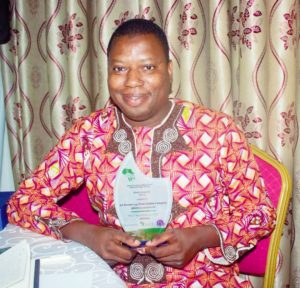
Ibrahim Abubakar won second place in print/online category
The chairman for the event , Prof. Alhassan in his statement encouraged Journalists to write more to put to rest the vilification of GMOs. He also tasked regulatory bodies and Ag biotech stakeholders to release the Bt cowpea that has successfully undergone trials to farmers, “Once it’s in the farmers’ hands, they will use it and its communication will become easier” He opined. He also requested that OFAB collaborates with other companies to enhance the value of the awards scheme to attract more media practitioners.
Linda Asante-Agyei who was also the keynote speaker, in her speech that centred on “Promoting Economic Growth in Ghana Through Credible and Balanced Science Reporting” urged scientists to open up to the media in communicating science and not wait for rumors to be published before coming out to address the public. Also advising her fellow journalists, she said “As journalists we have a vital role to play in reporting accurate and true information. If you do not understand the subject matter you’re reporting, seek into it. Our role is very important in promoting adaption through accurate reports. The technology has a positive impact we need to project. The negatives we hear about it do not have scientific proof“. She further congratulated OFAB for their work and encouraged them to hold constant training schemes for journalists to match the dynamism of the area.
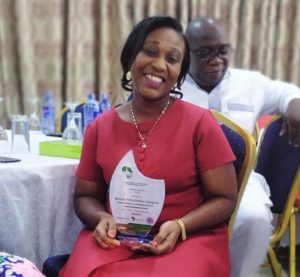
Ama Achiaa Amankwah Baafi won first place in print/online category
The Director for BNARI, Prof. Kenneth Danso also addressed participants on the benefits the country can gain from biotechnology and the need to commercialise it. He said “Biotech is a good technology that can stop the in-variance of challenges we are facing worldwide in Agriculture as a result of climate change. Countries that are adapting the technology are making tremendous benefits exporting large quantities of food to other parts of the world. Unfortunately for Ghana, we’ve not been able to do that even though we have a lots of work done on our biosafety regulations. I think with the kind of work done on biosafety, we are at a place where we can regulate GM crops in the country very well. We’ve done lots of field works. What is left now is to move the technology to the field. When farmers see what is on the field and appreciate it, they will easily adopt the technology“.
He appealed to the media to help disseminate positive information on biotechnology to help achieve the purpose, “I’m appealing to the media and journalists to help the scientists in moving the technology to farmers. Let people hear about the technology as you write so that people will raise questions and as we answer them, they will appreciate the technology. Biotechnology is not rumor based, it is science and science is based on facts that has been set. So I plead with you to help move the technology so that we benefit from it as other countries are“.
Former Deputy Minister of Agriculture Dr. Alhassan Yakubu also added that science should be looked at in a different perspective in the country. He said, science drive our lives and no economy ever gets transformed without science and technology. He advised citizens to rather get involved in more productive and informed debates so the country matches up with others who are doing well in the sector.
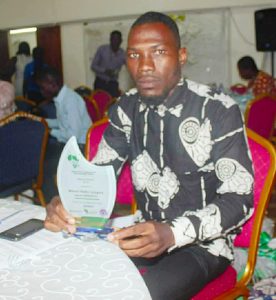
Salifu Wononuo won first place for radio category
Love For Science had the privilege to speak to the 2019 award winners to ask of their motivation and views regarding biotechnology. Ama Achiaa Amankwah Baafi revealed to us how she came to have a change of mind about Ag biotech “ I write on business and Agriculture too but initially I thought issues on Agricultural Biotechnology were controversial so I didn’t want to go into it. But then I sat down to think and realized I should get to do more in it since we are all looking at sustainable ways of doing agriculture.” She encouraged more capacity building with the media to make it understand issues of Ag biotech.
Salifu Wononuo also told Love For Science his initial thought of science reporting as cumbersome was removed when he sought to learn about it. He was of the view that focusing on science and its reporting will be much beneficial for the country , ” Where I’m from, journalism has been reduced to writing sensational political stories. I sought to do something different, report on science. Initially, I thought it was difficult but with guidance I learnt to talk to the right people and write facts and that is what has gotten me here. I will encourage my fellow journalists to look at subjects that will impact our lives positively than to focus on sensationally provoking works“.
Ibrahim Abubakar also did add that the controversy surrounding the technology is what is making most journalists shy away from it. He added that negative thoughts about the technology should be dropped and science embraced, “We all know what is happening with climate change. To forestall food security issues, we need to embrace it, it is science. If science has cured diseases and addressed other human problems, why can’t we move with it. Science is research and research is facts” he said.
Mary Kudom Agyemang, at the end, tasked the media to do more in communicating the science and also increase their participation in the scheme to broaden the scope of its understanding.
The program was organised by the Open Forum on Agricultural Biotechnology (OFAB) Ghana in collaboration with Kenyan based NGO, African Agricultural Technology Foundation (AATF) and the Council for Scientific and Industrial Research (CSIR) Ghana.
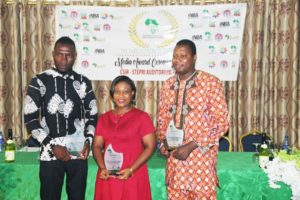
The three award winners pose for a picture
By: Dennis Baffour-Awuah

